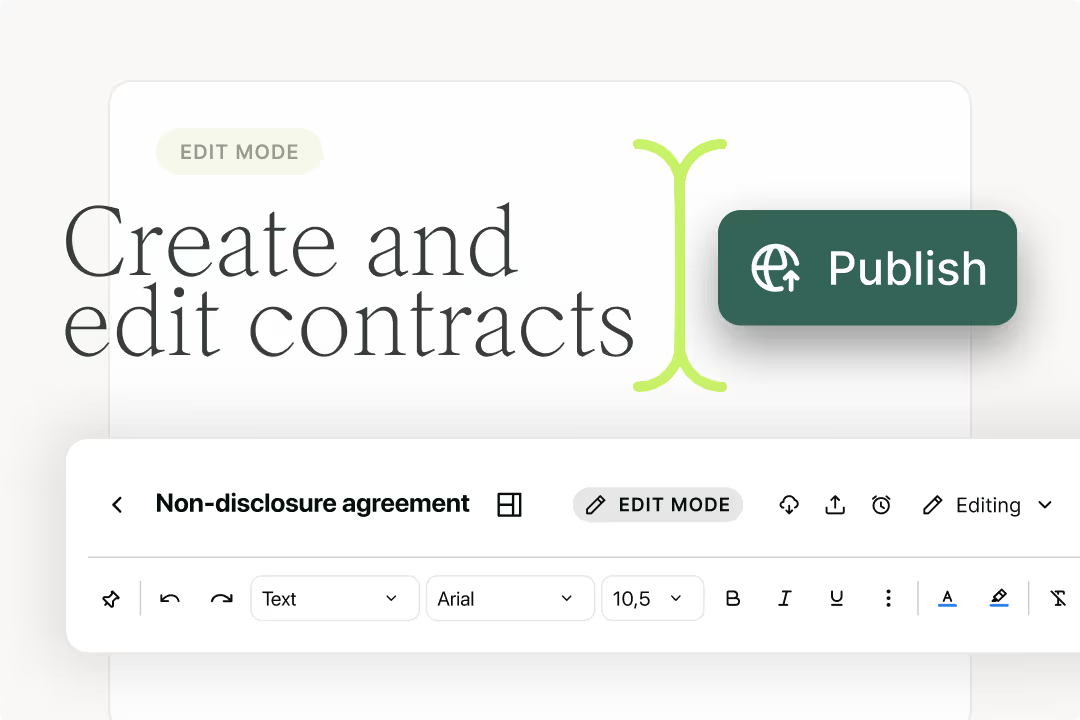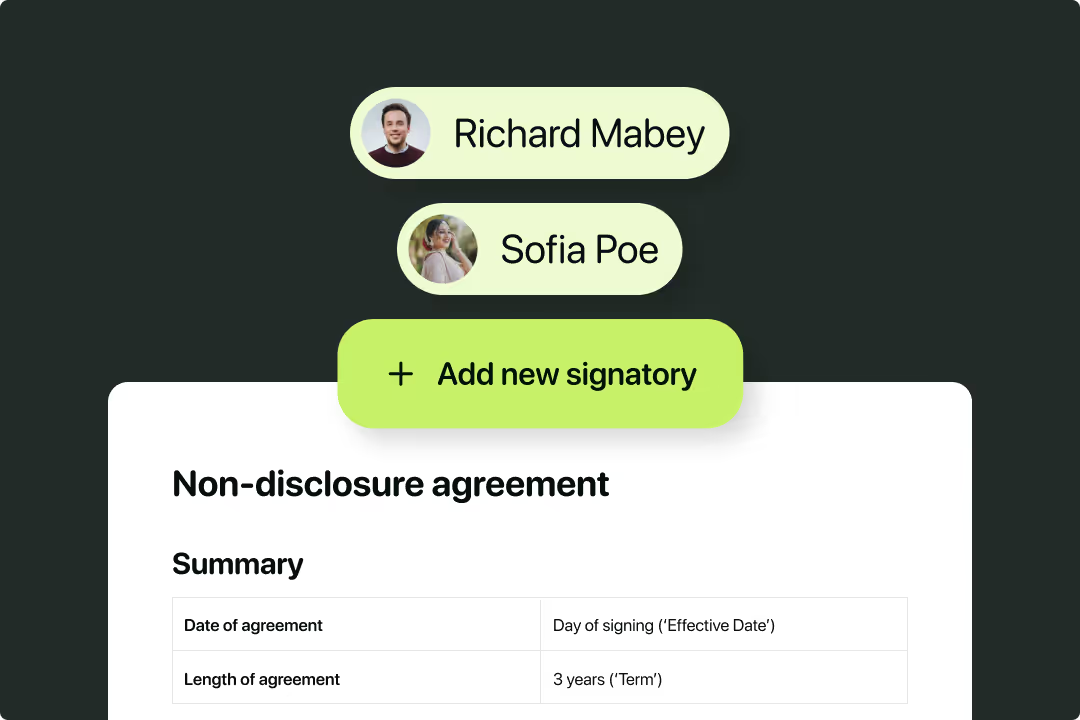Solutions
Customer Support
Resources
Contracts have a reputation for being slow, complex, and frustrating — but that complexity isn’t inevitable. Whether you’re managing ten contracts or ten thousand, the same problems tend to crop up again and again: documents you can’t find, drafts that spiral out of control, and processes that rely too heavily on manual effort.
The good news? These challenges aren’t a sign that contract management is broken — they’re a sign that it’s ready to be modernised. Below, we break down the most common contract management challenges and how teams are successfully overcoming them with smarter, more connected systems.
But what are those challenges and how can you manage them? Below, we’ve listed five of the top challenges commonly faced by contract owners and how you can resolve them.
Contract visibility means how easy it is to find, review, track and extract important information from your contracts.
However, a recent report from Gartner revealed that many companies do not consider contract visibility to be a priority, noting: “Several Gartner clients candidly admit they don't know where all their contracts are."
Legal departments oversee a lot of contracts and they need to be able to do this effectively. It is important for all those dealing with contracts to have visibility into them to keep on top of compliance, contractual terms and regulations.
The strength of your contract visibility has a direct impact on the contract lifecycle. Contract visibility is key because it ensures that organizations have control over their contract at all times.
From seeing exactly where a contract is in its lifecycle to tracking contractual obligations and deadlines, visibility is key to getting a contract over the line.
For example, being able to see where a counterparty has made an edit in a contract that has gone quiet could reveal a friction point, flagging that you might need to revise a certain term or clarify a point of confusion.
Contract management software (CMS) can solve this challenge, as it unites all contracts on one platform allowing users to access them at any time from anywhere - creating global visibility.

Visibility is also important in contract versioning. In order to ensure all parties are reviewing, negotiating and ultimately signing the right version of the contract, that document needs to be easy to find, with a digital audit trail to rule out the possibility of mistakes.
Take RVU, the company behind Confused.com, Uswitch and Tempcover, as an example. Juro revolutionized their contract management and won back 30 percent of legal’s time, in part by simply improving the visibility of contracts throughout the business.
The process of drafting contracts needs to be consistent across the business to avoid friction in your contract lifecycle management process. A few examples of poor contract drafting are:
Poor contract drafting process delays the contract lifecycle in general, but the good news is that these issues are fixable. You can address these issues by:
1. Using standardized templates and clauses across the business. Templates allow those drafting contracts to save time and still maintain a high standard.
Now, you can even automate this process using a CMS. The legal team creates a master version of the contract, allowing colleagues to create contracts themselves on a self-serve basis, just changing a few key fields each time.
This ensures that legal aren't spending valuable time drafting on behalf of others and that the process is repeatable.

2. Use a truly digital solution. Creating a centralized process will make drafting a much simpler process. If contract review, negotiations and management all take place on the same platform, it is easier to follow.
A truly digital solution will allow you to collaborate internally and externally on contracts securely in one system - this could be anything from negotiation to signing.
{{quote1}}
3. Using a contract database. A centralized, secure database allows your team to store contracts safely and more importantly, make them searchable.
Naturally, this varies depending on the size and maturity of a company. For example, a new joiner taking control of contracts at a fast-growth startup won’t need the same scale of monitoring.
The sooner a simple, effective contract repository or database is in place, the better. Collecting and tracking documents that are important to risk and revenue can protect your company further down the line.
If you’re a startup looking to get through an investment round, or a larger company looking to take part in a corporate transaction, then having contracts immediately available for the data room can relieve a huge admin burden and set you up for success.
Juro’s platform includes a data-rich repository for contracts - read this guide on how to create your own.
Drafting can also be made easier with tools like Juro’s AI assistant, which helps users to draft, summarize and review contracts 10x faster than with purely human-led processes.

All companies are legally required to follow certain regulations and protocols. Contract compliance describes the procedures companies have in place to prove that they are conforming to these regulations.
Compliance is a non-negotiable part of a broader contract management strategy, helping to ensure that contracts are executed correctly at all stages, pre and post signing.
This can be a challenge, particularly for businesses managing high-risk contracts, or high volumes of contracts (or both). The issues commonly associated with contract compliance include:
Failing to meet compliance standards can damage your company's reputation, as well as damage existing relationships with clients. Regulations are there to protect both parties and establish trust - if you miss the mark on this it could have catastrophic consequences.
Creating a playbook for your team to follow is a great first step. Often, people will be self-serving on certain contracts, perhaps for the first time. Creating a central playbook will answer peoples FAQs and help to streamline the process, whilst also removing the risk of non-compliant behaviors.
You should also aim to outline any changes in the law or the relevant regulations in training sessions held by the legal or compliance team, as these are constantly changing.
As mentioned above, templates are a contract's best friend. Creating a bank of templates can help to eliminate uncertainty, ensure consistency and minimize non-compliance. With Juro’s automated contract templates, legal teams can define a Q&A flow for commercial teams to use.
For more tips on how to ensure contract compliance, use this checklist.

Contract tracking is exactly what it says on the tin. It means that key stakeholders, especially legal, are able to see the exact point a contract is at in its lifecycle, without having to investigate across multiple systems.
Poor contract tracking can lead to a number of negative outcomes for a business. It can cause friction while closing a deal, either because the parties can’t see the status of the contract or internal friction between team members unable to see what is causing a delay.
Equally, poor tracking leads to higher risk. If stakeholders are unable to keep track of contracts or negotiations, then it is open to language slipping or non-standard terminology slipping in which increases the risk to the business.
Believe it or not, untracked contracts can go missing. Without a secure system and database companies can struggle to monitor contracts, see when a renewal date may be or recognize revenue.
For a smaller business looking to grow, untracked contracts are a nightmare, especially for due-diligence.
Don’t overthink it. Take a look at how you currently track contracts, this could be during a contract management audit or simply by looking into your contract visibility.
If you are just starting out try something like this free contract repository spreadsheet, which will give you visibility across the contract lifecycle. This is most useful for those managing a smaller number of contracts, as larger volumes may require a more dynamic solution.
An all in one contract automation platform will make it easier to generate the data you’ll need to track contracts properly, and likely have integrations with other key business systems such as Salesforce, Hubspot and Slack.
To discover how Juro can help you to track contracts, read this full piece on contract tracking.
Standardizing contracts helps teams to scale their legal agreements and also reduces signing terms.
A standardized contract is an agreement between two parties which contains primarily non-negotiable contractual terms. Though they aren’t suitable for every contract type, standardization is great for low-risk, low-value contracts.
Without addressing all of the above, businesses can suffer and this manifests in a number of ways, including:
Standardizing contracts could be the answer as legal teams seek more efficient ways to manage contracts. Especially for low-value contracts such as software agreements, vendor agreements or Master Service Agreements.

Nailing your templates is the first step in kick-starting this process.
Look at amends you have made to previous contracts, any frequently asked questions by a counterparty and versions of this contract that have received the leads feedback. You can use this to build a contract that is optimized for signing.
The contract then needs to be designed, and we’re advocates for keeping it simple and making contracts accessible. Use plain language to present important terms, this will help make contracts more readable and get them signed faster.
Then, when it comes to signing itself. Why not standardize this process too? Make sure contracts are executed well by using an accessible eSignature solution that allows you to follow up with anybody yet to sign.
If you recognize some or all of the challenges above, Juro might be for you. Fill out the form below to book a demo with an expert today.
Lorem ipsum dolor sit amet, consectetur adipiscing elit. Suspendisse varius enim in eros elementum tristique. Duis cursus, mi quis viverra ornare, eros dolor interdum nulla, ut commodo diam libero vitae erat. Aenean faucibus nibh et justo cursus id rutrum lorem imperdiet. Nunc ut sem vitae risus tristique posuere.

